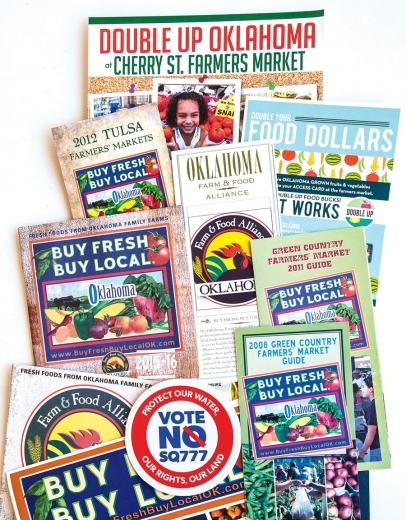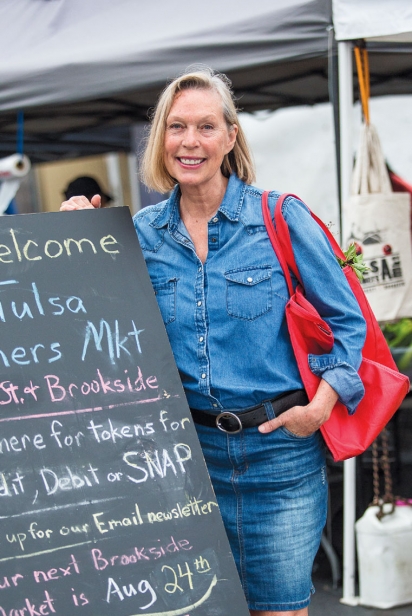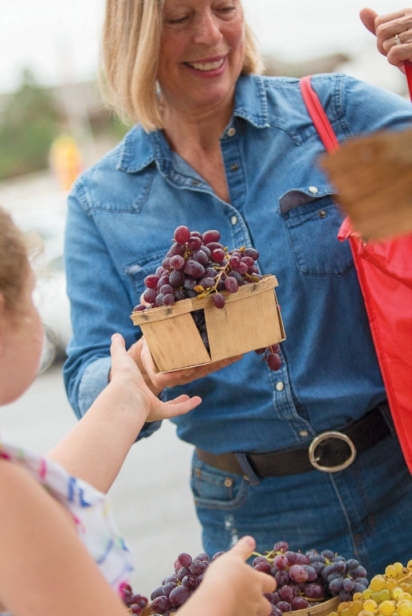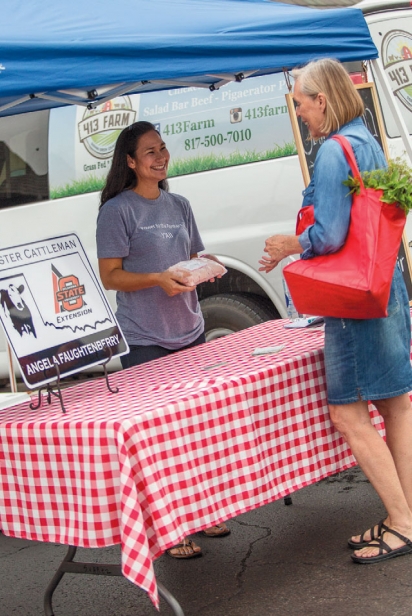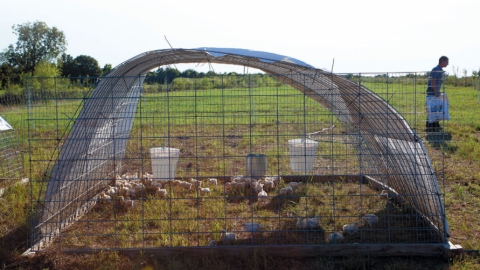Edible Profile: Rita Scott
Everywhere Rita Scott visits or even passes by as she walks the booths of the Cherry Street Farmers’ Market on a windy 90° Saturday morning, she leaves a soon-familiar chorus in her wake. Something along the lines of, “Bye, Rita! Thank you so much!” Gratitudes and appreciations—smiles and those happy sighs.
Rita Scott, adorned in a sun hat, loose clothes and a sensible tote, blends in easily with the crowd filing this way and that on the Cherry Street main thoroughfare. But as she walks the sidelines, meeting with vendors in a sort of weekly checkup as the outreach and education director of the Oklahoma Farm & Food Alliance, it’s impossible not to pick up on her presence on the fringes of your vision. She waves, she calls, she shouts hello, bringing to mind quite aptly the “Little Town” sequence from Beauty and the Beast. Songbirds tittering, people waving, bakers walking by with bales of bread.
“Look there she goes, the girl is so peculiar—no question here, she knows her stuff . . . “
Take Angela Faughtenberry, farmer and master cattleman of 413 Farm based out of Adair, Oklahoma, a mother of seven and a young newcomer to the market. At around 10 o’clock in the morning, Rita swings by her booth with a singsongy hello, to talk shop, give guidance, get intel. And her presence is far from unwelcome.
“I’m new to the Cherry Street and Brookside farmers’ markets,” says Angela. “On my opening weekend, Rita was one of the first Cherry Street board members to give me a warm welcome.” Apparently word has gotten around, since Angela was already sold out of some of her hot-ticket items by midway through the market, and was now relegated largely to casually running down the clock with her remaining wares, turning away people seeking chicken meat long gone. Workmanlike and at ease, you would hardly guess she was a relative rookie to the scene, and Angela credits Rita with helping her hit the ground running.
In just seven weeks, Angela says, Rita was able to hook her up with contacts for a commercial kitchen, information on grant writing workshops, a selection of cost-share programs to provide additional fencing for her lamb crop, and even connected her to the Oklahoma Director of Agriculture to discuss the importance of approving an in-state poultry processor for the state of Oklahoma.
“Her support of my farm,” Angela says, “is priceless.”
“I like to think of myself as a connector,” Rita tells me, embarking farther down the lane. But it’s more than the pragmatics of the puzzle that drives her. She’s more than a walking Rolodex—there’s more heart involved than that. The market’s mother superior, of a sort. As we walk, she spies my forehead sweating in the sun. “We need to get you a hat.”
Of course, the relationship between her and the vendors is mutually beneficial, by at least one certain metric. The more comfortable vendors feel in their capacity as independent merchandisers at the farmers’ market, the better the market overall. That’s not just good for the bottom line; as far as Rita Scott is concerned, it’s a mission statement—felt deeply.
At the booth of Squeakie Brown of Middle Mountain Dairy, I eat delicate cheeses off of little sticks while Rita and Squeakie sidebar over an issue that appears to be, at a glance, of grave importance. But it soon becomes evident that the topic of the day is plastic bags, and an enthusiastic five-minute discussion is had over whether we should continue bulk ordering these “T-shirt” style bags from China or perhaps find some other distributor—or vice versa. I wasn’t listening, it gets muddled, as the information I write down trails off with my interest around the point they start discussing the merits of knowing the exact millimeter width of the handles of a plastic bag. It drifts on into another gathering of intel. Oh, are your customers having any problems with the bags? Do you have any suggestions? OK, call me if you do.
The point is that these miniscule issues, all but invisible to the eye of the consumer, do not escape Rita’s attention. And what of her motivations? She’s certainly not getting paid on commission from this-or-that lobbying agency in the field of plastic sack technology. What led her to this line of work, an operation that began this century only large enough to fill one corner parking lot, and grew to involve a network of vibrant markets throughout the state?
A fifth-generation Oklahoman, Rita, whose face is framed on one side with a blonde bob, has a tendency in conversation to engage in touch, and lean in close with a magnetic, sharp intensity, lending a sort of conspiratorial air to any conversation with her. Hey, it’s just you and me here. As such, she earns your trust with a remarkable ease, drawing you into her vision. It’s a vision that springs naturally from a long appreciation of the farmer’s lifestyle, and the attendant challenges that go along with it.
Grandma Phoebe was her model, impressing by the way she was able to create something from seemingly nothing, to manipulate the whims of earth and weather to serve food, play host and sustain life. “Grandfather would get the staples of life,” Rita says, “but everything else, she was able to do.”
Sitting up close with her, being pulled into her energy field, you realize the rarity of the sort of person that she is. The sort who steps toward outstanding problems others keep their distance from and says, “Actually, I would like to try something.” And she’s been doing so for years.
Over the course of the last 15 years, she’s led, created and campaigned for grants for a whole many-acronymed web of farm-and food-based local initiatives, collectives and political movements, including Buy Fresh Buy Local, a project of the Kerr Center for Sustainable Agriculture; the Oklahoma Sustainability Network; Sustainable Green Country; the Tulsa Food Security Council; and finally, the Oklahoma Farm and Food Alliance, among other organizations that she’s either led, been involved in or teamed up with over the years. And naturally, she sits on the board for the Cherry Street Farmers’ Market. Her son, the Oklahoma state representative Seneca Scott, calls her a “trailblazer.”
She’s not naive to the fact that her labors are born out of love. “I care deeply,” she says. “I’m an advocate. I want to preserve and educate as many people as I can.” She’s a wellspring of caring and empathy. Always available for engagement with people, for their questions, getting opinions. They love her, by the way. She once wrote the governor, campaigning for a 2014 memorandum honoring the farmers of Oklahoma. And so it was done, signed and sealed.
Her political prowess is not to be underestimated. Scott Swearingen, president of the board of the Cherry Street Farmers’ Market, credits her with single-handledly establishing the well-known Double Up Food Bucks program as a presence in the state. “She brought Double Up to Oklahoma,” says Swearingen, unequivocally. “The legislation period was about to run out. Rita decided she wasn’t going to let that happen. She understands how it all connects. We’re all working with the market, and she—she does so much.”
Pinning down what a typical workday is like in the life of Rita Scott is not so easy, because the nature of her job changes day to day, rising to meet new challenges as old ones fall. “Because you know I’ll do this whether I get paid or not,” she says, matter-of-factly. “I’ll get a grant, I’ll get paid, I’ll continue doing it not being paid. The pay is not why I do things.”
We talk for an hour at the Café Cubana, up until the market closes down, and we part ways. I’m the only one who stands up, saying goodbye. As for Rita?
“I’ll be here,” she says, from her seat. “I’ve just got a little bit of work left to do.”


